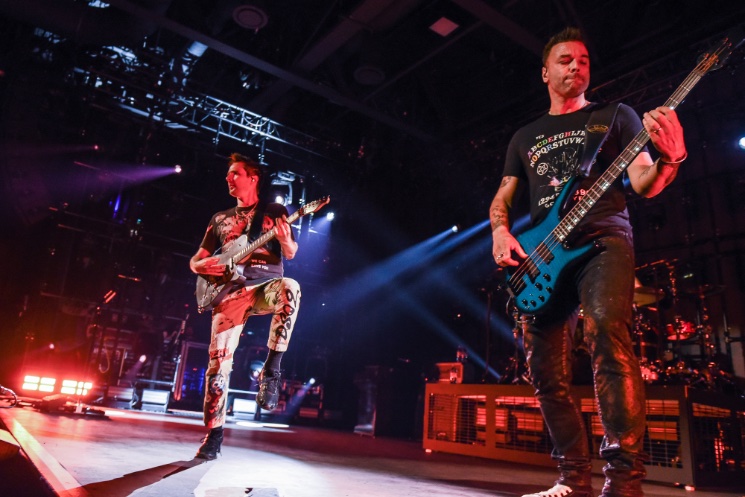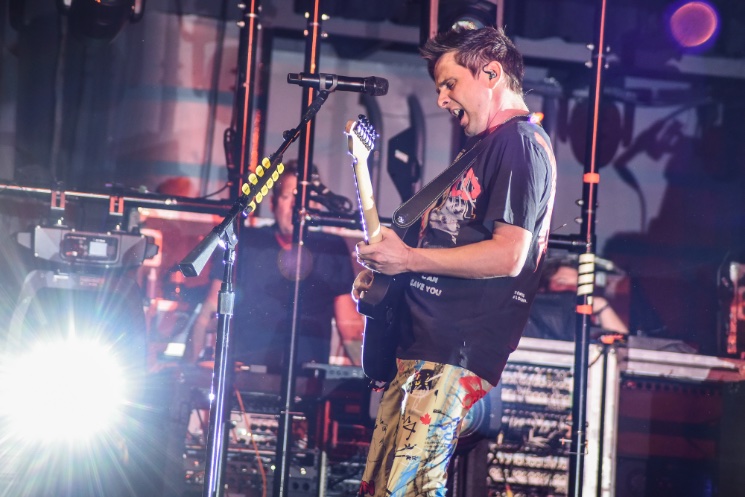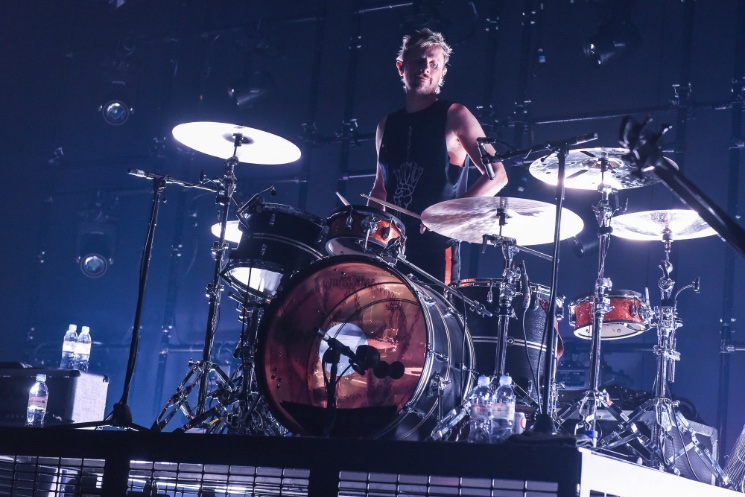Muse stepped outside their usual stadium setting Friday night in Toronto, bringing their latest dystopian semi-concept record — this summer's Will of the People — to a crowd of eagerly-awaiting fans who seemed enthralled by the chance to see the band at a smaller venue.
"Sold Out" flashed across the blue marquee at History as fans braved the chill air in a queue wrapping to the building's rear. The venue has a 2,500 capacity, a vast difference from the nearly 20,000-seat arena show recently announced in Toronto for Muse's extended 2023 tour; despite the more intimate setting, the band conjured all the energy, pomp and slight emotional remove of a much larger showing.

The band — singer/guitarist Matt Bellamy, drummer Dominic Howard and bassist Chris Wolstenholme — stepped onto the red-lit stage and vaguely addressed the crowd with single-handed waves before their instruments exploded to life. A wash of red lighting coated the audience as Bellamy belted a song from their latest; the crowd seemed surprisingly engaged with the new material, sending the bands energy directly back to them. The dramatic lighting was a show of its own, though there wasn't much reliance on production, gimmicks or stage antics to carry the performance — despite the band's general flair for drama and big gestures, it was quickly evident that the music was front and centre.

After transitioning into "Assassin" from 2006's Black Holes and Revelations, it became clear that the crowd's warmth for the previous track was partly due to their excitement at the band's emergence and not necessarily the new material itself. Bellamy's guitar slithered rapid-fire across the song with a surging momentum, changing the trajectory of the room as the cheers shifted from excitement to pure exhilaration. Heavy red lights still draped the stage, but the band slid into nearly different personas, with Bellamy spending a fair portion of the song on his knees at the stage's edge while Wolstenholme prowled in and out of the darkness, amplifying his signature blue LED bass. They slid smoothly from one head-banging track to another, adding more embellishment as the show went on — Bellamy spent guitar solo after guitar solo on his knees, while each of Howard's drum solos became a spectacle of white lights from beneath the pedestal he was perched on.

Audience interaction wasn't a priority during the show, though clear crowd favourite "Starlight" depended on it — played 11 songs into the set, the track saw Bellamy address the crowd for the first time, ditching his mic stand to roam the stage and relying on the audience to sing the chorus's entirety. The room chanted along freely with Bellamy, who once again fell to his knees, his mic outstretched to the crowd.
The only noticeable dip in energy came at the set's end when, perhaps unsurprisingly, the band pulled more heavily from their older catalogue, particularly 2006's Black Holes and Revelations. "Supermassive Black Hole" — the song that introduced Muse to an entire generation of Twi-hards — threw the crowd into a frenzy, though Bellamy seemed to be going through the motions, offering a few uninspired thrusts. The dichotomy between the band's fan-beloved older material and their perhaps lesser-loved new recordings was never clearer.

Throughout the night, there was a consistent push and pull between old work and new that elicited completely different reactions from the crowd and the band themselves. The older work garnered the most energy and anticipation from the audience, despite the band appearing slightly unengaged when tearing through it. The feeling was compounded when they returned for an encore by kicking things off with this year's "Compliance," dampening the crowd's energy before pulling out 2006's "Knights of Cydonia" and closing things on a headbanging high. Muse are evidently determined not to have their past define their present — the fans seem less concerned.
"Sold Out" flashed across the blue marquee at History as fans braved the chill air in a queue wrapping to the building's rear. The venue has a 2,500 capacity, a vast difference from the nearly 20,000-seat arena show recently announced in Toronto for Muse's extended 2023 tour; despite the more intimate setting, the band conjured all the energy, pomp and slight emotional remove of a much larger showing.

The band — singer/guitarist Matt Bellamy, drummer Dominic Howard and bassist Chris Wolstenholme — stepped onto the red-lit stage and vaguely addressed the crowd with single-handed waves before their instruments exploded to life. A wash of red lighting coated the audience as Bellamy belted a song from their latest; the crowd seemed surprisingly engaged with the new material, sending the bands energy directly back to them. The dramatic lighting was a show of its own, though there wasn't much reliance on production, gimmicks or stage antics to carry the performance — despite the band's general flair for drama and big gestures, it was quickly evident that the music was front and centre.

After transitioning into "Assassin" from 2006's Black Holes and Revelations, it became clear that the crowd's warmth for the previous track was partly due to their excitement at the band's emergence and not necessarily the new material itself. Bellamy's guitar slithered rapid-fire across the song with a surging momentum, changing the trajectory of the room as the cheers shifted from excitement to pure exhilaration. Heavy red lights still draped the stage, but the band slid into nearly different personas, with Bellamy spending a fair portion of the song on his knees at the stage's edge while Wolstenholme prowled in and out of the darkness, amplifying his signature blue LED bass. They slid smoothly from one head-banging track to another, adding more embellishment as the show went on — Bellamy spent guitar solo after guitar solo on his knees, while each of Howard's drum solos became a spectacle of white lights from beneath the pedestal he was perched on.

Audience interaction wasn't a priority during the show, though clear crowd favourite "Starlight" depended on it — played 11 songs into the set, the track saw Bellamy address the crowd for the first time, ditching his mic stand to roam the stage and relying on the audience to sing the chorus's entirety. The room chanted along freely with Bellamy, who once again fell to his knees, his mic outstretched to the crowd.
The only noticeable dip in energy came at the set's end when, perhaps unsurprisingly, the band pulled more heavily from their older catalogue, particularly 2006's Black Holes and Revelations. "Supermassive Black Hole" — the song that introduced Muse to an entire generation of Twi-hards — threw the crowd into a frenzy, though Bellamy seemed to be going through the motions, offering a few uninspired thrusts. The dichotomy between the band's fan-beloved older material and their perhaps lesser-loved new recordings was never clearer.

Throughout the night, there was a consistent push and pull between old work and new that elicited completely different reactions from the crowd and the band themselves. The older work garnered the most energy and anticipation from the audience, despite the band appearing slightly unengaged when tearing through it. The feeling was compounded when they returned for an encore by kicking things off with this year's "Compliance," dampening the crowd's energy before pulling out 2006's "Knights of Cydonia" and closing things on a headbanging high. Muse are evidently determined not to have their past define their present — the fans seem less concerned.
